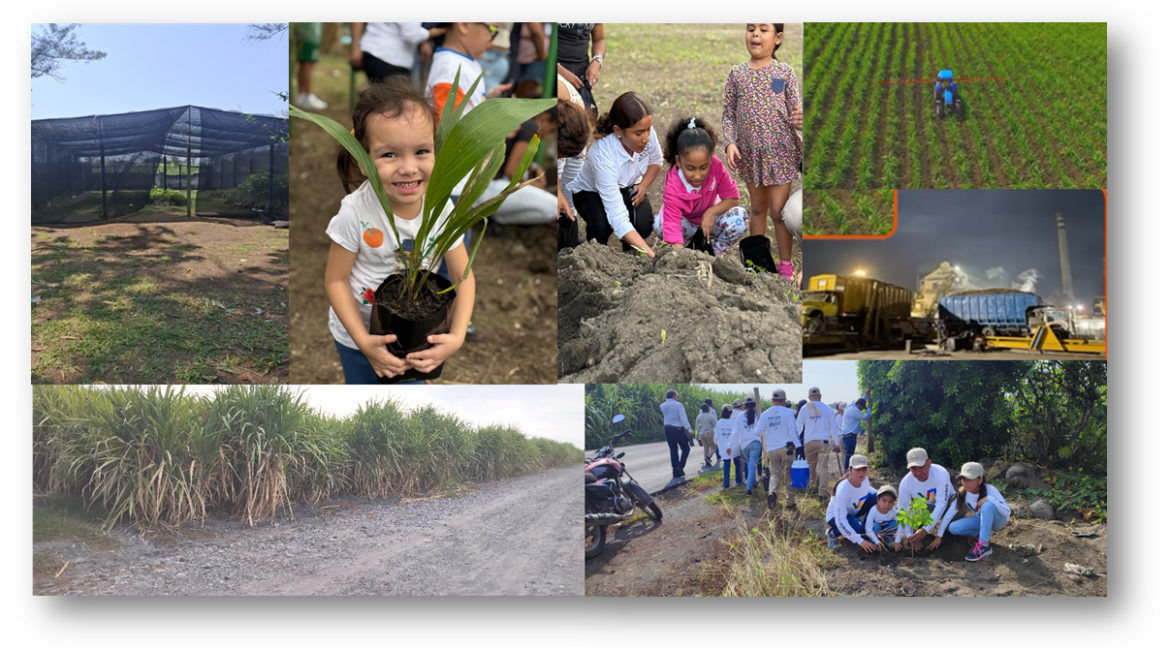By Cámara Nacional de las Industrias Azucarera y Alcoholera
Advances in Social Responsibility and Sustainability in the Sugar Industry
Mexico’s sugarcane-producing regions are highly diverse, as they are located in geographically distinct areas: some in the Gulf of Mexico, others along the Pacific coast, as well as in the central and southeastern parts of the country.
The National Chamber of the Sugar and Alcohol Industries (CNIAA) presents its 2025 results report from the first two Good Practices meetings, highlighting the efforts of the mills in the Northeast and Gulf regions to strengthen their commitment to sustainability, worker well-being, and community development.
Mexico’s sugar industry is moving toward a more responsible model, aligned with ESG (Environmental, Social and Governance) criteria and the United Nations 2030 Agenda Sustainable Development Goals (SDGs).
Commitment to Environmental Sustainability
Mills in both regions have implemented reforestation programs, energy efficiency measures, and responsible resource management initiatives.
- In the Northeast, some actions by Zucarmex and Pantaleón include planting more than 1,380 trees, implementing energy self-sufficiency programs, and measuring their corporate carbon footprint.
- In the Gulf region, Zucarmex–Mahuixtlán has planted more than 200,000 trees since 2011; meanwhile, Fundación Beta San Miguel promotes regenerative agriculture, fostering healthier soils and greater climate resilience.
Circular economy practices are also being promoted, such as the use of organic waste and the replacement of lighting with LED technology.

Workers well-being and capacity building
Strengthening human capital is a central pillar of the sustainability strategy.
- In the Northeast, mills reported more than 403,000 hours of training, including leadership programs, occupational safety, and technical development.
- In the Gulf, Grupo Porres and Fundación Beta San Miguel implemented financial education and technical training programs for growers and cane cutters, benefiting more than 1,300 people.
- Hydration, shade, and rest programs are also highlighted, along with free medical care and preventive health campaigns that have supported thousands of field workers.
Elimination of child labor and education
One of the strongest pillars of the report is the commitment to eradicating child labor and promoting education.
- In the Northeast, Fundación Pantaleón supported 186 schools and delivered 1.7 million school breakfasts.
- In the Gulf, Ingenio La Gloria developed the “La Gloria Without Child Labor” program, including awareness campaigns, children’s activities, and training for more than 1,000 people.
- Groups such as Porres, PIASA, and Fundación Pantaleón have also rehabilitated schools, libraries, and potable water systems, benefiting over 11,000 people directly and indirectly.
- Additionally, Grupo PIASA maintains its annual “Saquito de Honor” program, recognizing academic excellence among primary, secondary, and university students. Together with Banco Santander, they also award scholarships through the “Open Academy” program, benefiting 300 children and adolescents.
Community Engagement and Social Development
Engagement with communities is an essential component of the sector’s sustainability.
- Mills have supported cultural, sports, and gender equity initiatives, such as the “Women in the Fields Gathering,” which brings together women producers, agricultural workers, and factory operators to share professional experiences. Another notable program is the Cinépolis Route, which brings cinema to remote rural communities. These efforts promote inclusion and social cohesion.
- Grupo Porres runs the “Comiendo Contigo” program, providing meals and Christmas dinners to more than 4,800 cane cutters and their families, and supports the rehabilitation of schools and rural shelters.
- Fundación Pantaleón and Fundación Beta San Miguel promote women’s entrepreneurship, creating sustainable income opportunities and improving quality of life through business-skill training for rural women, the purchase of supplies, and the launch of small businesses such as water purification plants, fine pastry shops, hair salons, and bakeries.
- Grupo Porres and Fundación Pantaleón, through the Nido Águila soccer school, foster sports, family integration, mental health, women’s physical activity, and academic development, benefiting more than 150 children.
Conclusion
The report tracks the actions undertaken by the Mexican sugar industry under a commitment to a culture of comprehensive sustainability, where productivity coexists with social and environmental responsibility.
Advances in health, education, equity, the environment, and community development reflect the sector’s commitment to a fairer, more inclusive, and more sustainable future.
In summary, the CNIAA and the mills of the Northeast and Gulf regions are transforming the sugarcane value chain into a model of sustainable development, where every action—from the field to the community and the mills—contributes to a positive and lasting impact.

